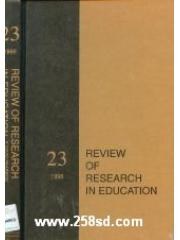

* Introduction<br > hen our advisory board met in September of 1996 to develop an outline and<br > structure for the 1998 volume of the Review of Research in Education, we<br >did what boards like this must have done over the years--we brainstormed topics<br >and issues that deserved a place between the covers of the latest volume of RRE.<br >We grounded our brainstorming activity in three ways. First we looked to the past<br >by considering an analysis of topics covered in the first 20 odd volumes of RRE<br >and the last 10 years of the Review of Educational Research, trying our best to<br >uncover themes and issues that we had unintentionally obscured over the years.<br >Second, we looked to the future: Mindful of the dawn of a new century, we asked<br >ourselves which issues and questions our profession ought to be addressing as we<br >move into that new century. Third, we looked to the present and asked ourselves<br >which topics were so important at this point in our history that we could not help<br >but give them voice. At the end of the first day of our meeting, we had filled up<br >some 15-20 large sheets of chart paper with deserving topics and issues, enough<br >literally for a decade s worth of RRE volumes. So much to know, so little space!<br > As we looked across the topics, however, some themes began to emerge. For<br >example, we were sure that issues of special education had not been given full<br >voice, but what was especially interesting about special education were competing<br >views about how teaching and learning ought to be organized in our schools and<br >classrooms. It was the social aspect of how the learning of special students was<br >organized that intrigued us. And we knew it was time for technology to be<br >re-examined, but again what we found interesting about technology were the ex-<br >plicit and implicit social relations that are involved in technology-centered learn-<br >ing, especially in asynchronous learning contexts. We knew that tutoring was gath-<br >ering enough momentum, especially in early literacy programs, to deserve a full<br >review, but what had not been adequately addressed was the social face of tutor-<br >ing--the interactions between tutor and student. We also knew that motivation<br >deserved to be covered again, but we wanted a reading of the literature that empha-<br >sized motivation in the contexts of schooling, where social aspects would be domi-<br >nant. We had also committed ourselves to at least two chapters on methodology,<br >one which would enhance our quantitative tools and a second which would en-<br >hance our qualitative tools. And we were excited as we persuaded ourselves that<br >we would be able include methodological chapters related to the overall theme of<br >the volume.<br > By this point in the conversation, on the morning of day two of our meeting, that<br >theme was pretty clear to us. It would be the social organization of learning, and<br >we would address several important topics through that broad lens. What remained<br >was to sketch out the lead chapters, the chapters that would speak most directly to<br >
具体描述
读后感
用户评价
相关图书
本站所有内容均为互联网搜索引擎提供的公开搜索信息,本站不存储任何数据与内容,任何内容与数据均与本站无关,如有需要请联系相关搜索引擎包括但不限于百度,google,bing,sogou 等
© 2025 onlinetoolsland.com All Rights Reserved. 本本书屋 版权所有
















![京剧连环套 中国戏曲永恒经典(3VCD) [套装] pdf epub mobi 电子书 下载](https://doubookpic.tinynews.org/ed730f8a2c328d24049493cb09bfb29dd3135d0d633451cd183e37276e9e6b5b/s3400744.jpg)



